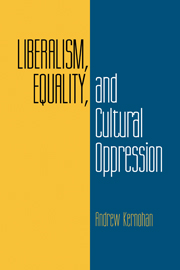2 - Liberalism and the Epistemology of Value
Published online by Cambridge University Press: 11 January 2010
Summary
The culture we live in is the totality of socially transmitted beliefs, meanings, values, ideas, norms, and institutions that form the background to our lives. I have stipulated that cultural oppression is the social transmission of false ethical beliefs. I am using “ethics” here in its broad sense to include both claims about an individual's moral obligations to others and claims about an individual's good or well-being. Considerable indeterminacy exists concerning the truth or falsity of ethical beliefs, and reasonable people can disagree about many ethical claims, especially those having to do with what constitutes someone's well-being. For egalitarian liberalism, however, there can be no indeterminacy about a belief in the unequal moral worth of all persons. Such beliefs must be regarded as false. It follows that cultural practices which transmit such beliefs are oppressive. But it does not yet follow that transmitting them is harmful. Harms are setbacks to interests; someone's interests consist in getting what he wants, and what he wants is still what he wants whether those wants are based on true beliefs about value or on false beliefs.
CULTURAL OPPRESSION AND SELF-RESPECT
One harm that egalitarian liberalism should see in the social transmission of false beliefs about moral inequality is a harm to people's selfrespect. For Rawls, self-respect is perhaps the most important primary good. It is a primary good because someone needs to have self-respect in order to pursue her conception of the good, no matter what she believes to be valuable in life, and no matter what it is she wants to achieve.
- Type
- Chapter
- Information
- Liberalism, Equality, and Cultural Oppression , pp. 26 - 47Publisher: Cambridge University PressPrint publication year: 1998



